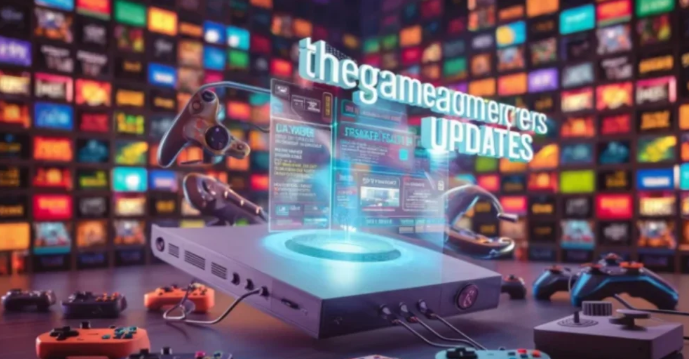In the rapidly evolving world of gaming, staying abreast of the latest developments and updates is crucial for both enthusiasts and industry professionals. One platform that has been at the forefront of archiving and chronicling these changes is Thegamearchives. This repository of gaming history not only preserves past milestones but also provides valuable updates that help gamers and historians alike understand the trajectory of the gaming industry. Exploring what they mean for the community and how they reflect broader trends in the gaming world.
A Comprehensive Archive: What’s New?
Thegamearchives has always been dedicated to documenting the evolution of video games, from their humble beginnings to the sophisticated experiences of today. The platform has recently undergone significant updates that enhance its functionality and accessibility. These updates are designed to make it easier for users to explore, understand, and contribute to the extensive database of gaming history.
One of the most notable updates is the expansion of the archive’s catalog. Thegamearchives has significantly broadened its scope, now including not just classic titles but also more recent releases. This expansion allows users to trace the development of games over time, offering insights into how game design and technology have progressed. The new additions cover a wide range of genres and platforms, from early arcade games to contemporary console and PC titles. This comprehensive approach ensures that both historical and modern gaming experiences are well-represented.
Enhanced Search and Navigation Features
Another major improvement is the overhaul of the search and navigation system. Previously, finding specific games or information within. Thegamearchives could be somewhat cumbersome, particularly for users unfamiliar with the platform. The latest updates have introduced advanced search features that allow users to filter results based on various criteria such as game genre, release date, platform, and developer. This refinement makes it much easier for users to locate specific entries and explore related content.
The redesigned navigation system also contributes to a more intuitive user experience. With improved categorization and tagging, users can now browse through related games. read detailed articles, and access multimedia content such as screenshots and gameplay videos more seamlessly. This enhancement not only improves accessibility but also enriches the overall experience of interacting with the archive.
Community Contributions and Collaboration
Thegamearchives has always valued community involvement and the latest updates reflect this commitment. The platform now features new tools and options for users to contribute their content. Gamers, developers, and historians can now submit their own articles, reviews, and historical analyses. This collaborative approach helps keep the archive dynamic and up-to-date, incorporating diverse perspectives and firsthand accounts.
Additionally, Thegamearchives has introduced a new system for user feedback and discussion. Forums and comment sections allow users to engage with each other, share insights, and discuss various aspects of gaming history. This interactive element not only fosters a sense of community but also encourages ongoing dialogue about the significance of different games and trends.
The Future of Gaming Archives
Looking ahead, Thegamearchives is poised to continue its evolution in tandem with the gaming industry. The platform is exploring the integration of emerging technologies such as augmented reality (AR) and virtual reality (VR) to provide more immersive experiences. These technologies have the potential to bring historical gaming moments to life in new and exciting ways, allowing users to experience classic games more interactively and engagingly.
Furthermore, Thegamearchives is committed to expanding its international reach. By incorporating games and content from various cultures and regions, the platform aims to offer a more inclusive and global perspective on gaming history. This expansion will help highlight the diverse contributions to the industry and provide a more comprehensive view of gaming’s impact around the world.
Conclusion
The recent updates to Thegamearchives represent a significant step forward in the preservation and celebration of gaming history. With expanded content, enhanced search and navigation features, and increased community involvement, the platform is better equipped than ever to serve as a valuable resource for gamers, historians, and enthusiasts. As the gaming industry continues to evolve. Thegamearchives remains dedicated to documenting and sharing its rich history, ensuring that the legacy of video games is preserved for future generations. Whether you’re a long-time fan or new to the world of gaming history. Thegamearchives offers an invaluable window into the past, present, and future of this dynamic and ever-changing field.
FAQs about Thegamearchives updates:
Q1. What are the recent updates to Thegamearchives?
Thegamearchives has expanded its catalog to include both classic and recent games, enhanced search and navigation features, and introduced new tools for community contributions and interaction.
Q2. How can I find specific games on Thegamearchives?
Use the advanced search features to filter results by criteria such as genre, release date, platform, and developer. The updated navigation system also helps you browse related games and access detailed content more easily.
Q3. Can I contribute content to Thegamearchives?
Yes, Thegamearchives now allows users to submit their articles, reviews, and historical analyses. There are also forums and comment sections for feedback and discussion.
Q4. What new technologies are being integrated into Thegamearchives?
The platform is exploring the use of augmented reality (AR) and virtual reality (VR) to offer more immersive experiences and bring historical gaming moments to life.
Q5. Is Thegamearchives expanding its global reach?
Yes, Thegamearchives is working to include games and content from various cultures and regions to provide a more inclusive and global perspective on gaming history.









